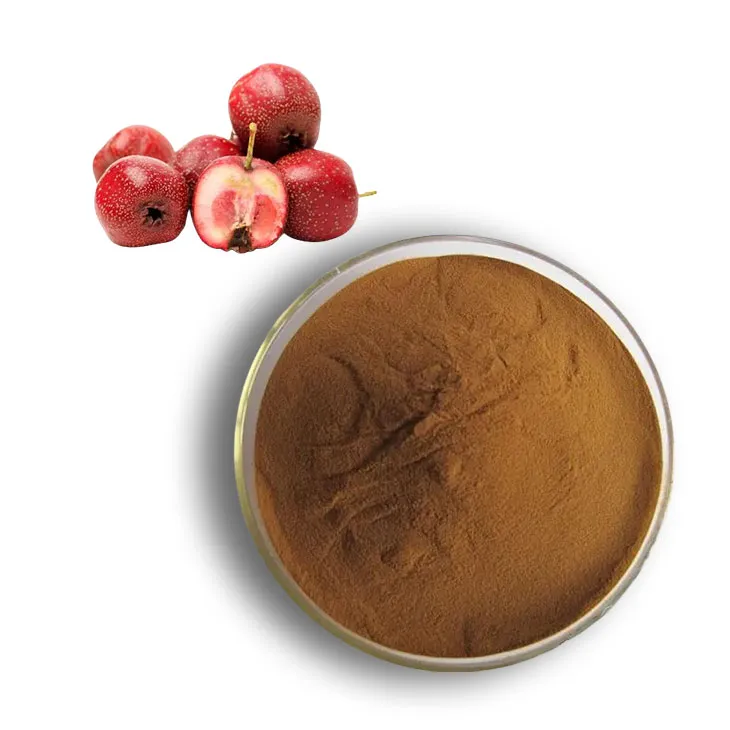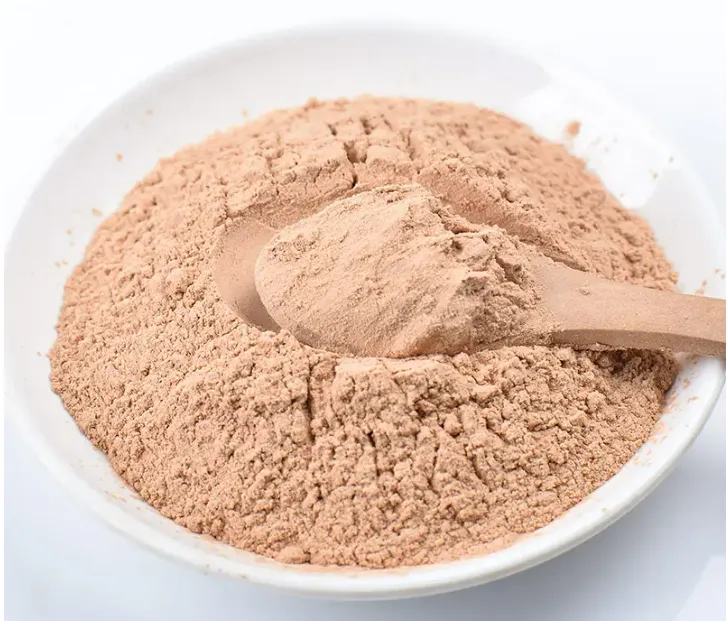- 0086-571-85302990
- sales@greenskybio.com
The Best Herb for Treating Anxiety and Insomnia: Hawthorn Extract
2024-11-12

Introduction
In modern society, anxiety and insomnia have become increasingly common problems that affect a large number of people. Hawthorn Extract is emerging as a potential natural remedy for these issues. This article will explore the various aspects of Hawthorn Extract in treating anxiety and insomnia, from its historical use in traditional medicine to modern scientific research.

Historical Use in Traditional Medicine
Hawthorn has a long history of use in traditional medicine systems around the world.
Traditional Chinese Medicine
In Traditional Chinese Medicine (TCM), hawthorn has been used for centuries. It was often used to improve digestion and blood circulation. However, its properties were also recognized for their potential impact on the mind and emotions. TCM practitioners believed that a balanced body, including proper digestion and blood flow, was essential for mental well - being. Hawthorn was thought to help regulate the body's energy, or Qi, which in turn could have a positive effect on reducing anxiety and promoting restful sleep.
European Traditional Medicine
In European traditional medicine, hawthorn was also highly regarded. It was used mainly for heart - related conditions. But over time, it was also noticed that patients who took hawthorn preparations seemed to have a more calm and relaxed state of mind. This led to the exploration of its possible role in treating anxiety and insomnia, as a more holistic view of health emerged.

Modern Scientific Research on Hawthorn Extract
Modern scientific research has been delving into the mechanisms by which hawthorn extract may be effective in treating anxiety and insomnia.
Interaction with Neurotransmitters
One of the key areas of research is how hawthorn extract might interact with neurotransmitters in the brain. Neurotransmitters play a crucial role in regulating mood and sleep. For example, gamma - aminobutyric acid (GABA) is an inhibitory neurotransmitter that helps to reduce neuronal excitability. Some studies suggest that hawthorn extract may increase GABA activity in the brain. By doing so, it can help to calm the nervous system and reduce anxiety levels. Another neurotransmitter, serotonin, is also involved in mood regulation. Hawthorn extract may influence serotonin levels, although more research is needed to fully understand this relationship. When serotonin levels are balanced, it can contribute to a more stable mood and potentially help with insomnia by promoting a more relaxed state conducive to sleep.
Antioxidant and Anti - inflammatory Properties
Hawthorn extract is rich in antioxidants, such as flavonoids. These antioxidants can help to reduce oxidative stress in the body. Oxidative stress has been linked to various health problems, including anxiety and sleep disorders. By reducing oxidative stress, hawthorn extract may protect the cells in the brain and nervous system. In addition, its anti - inflammatory properties may also play a role. Inflammation in the body can disrupt normal physiological functions, including those related to the nervous system. Hawthorn extract's anti - inflammatory effects may help to maintain a healthy nervous system environment, which is beneficial for reducing anxiety and improving sleep quality.

How Hawthorn Extract Reduces Anxiety
The reduction of anxiety by hawthorn extract is a multi - faceted process.
Calming the Nervous System
As mentioned earlier, through its interaction with neurotransmitters like GABA, hawthorn extract helps to calm the nervous system. A hyperactive nervous system is often associated with anxiety. When the nervous system is calmed, the body's "fight - or - flight" response is reduced. This leads to a decrease in symptoms such as rapid heartbeat, sweating, and restlessness that are commonly associated with anxiety.
Stress Hormone Regulation
Hawthorn extract may also play a role in regulating stress hormones. Cortisol is a stress hormone that is released in response to stress. High levels of cortisol over an extended period can contribute to anxiety. Some evidence suggests that hawthorn extract can help to modulate cortisol levels. By keeping cortisol levels in check, it can prevent the over - activation of the body's stress response system, thereby reducing anxiety.
Role of Hawthorn Extract in Improving Sleep Quality
Hawthorn extract has several mechanisms through which it can improve sleep quality.
Promoting Relaxation
By reducing anxiety and calming the nervous system, hawthorn extract promotes relaxation. A relaxed state of mind and body is essential for falling asleep and staying asleep. When the body is not in a state of tension, it is more likely to enter a restful sleep. Hawthorn extract can also help to relax the muscles, which further aids in the process of falling asleep.
Reducing Restlessness
For those who experience restlessness at night, hawthorn extract can be beneficial. It helps to soothe the mind and body, reducing the urge to move around constantly. This allows for a more peaceful sleep environment within the body, enabling a deeper and more restorative sleep.
Practical Ways of Using Hawthorn Extract
When considering using hawthorn extract for anxiety and insomnia, it is important to know the proper ways of use.
Dosage
The appropriate dosage of hawthorn extract can vary depending on factors such as age, health condition, and the form of the extract (e.g., tincture, capsule). Generally, for adults, a common starting dosage for a hawthorn tincture might be 1 - 2 milliliters, taken two to three times a day. For hawthorn capsules, it could be around 250 - 500 milligrams per dose, also taken two to three times a day. However, it is always advisable to consult a healthcare provider before starting any new supplement regimen to ensure safety and effectiveness.
Possible Combinations with Other Herbs
Hawthorn extract can be combined with other herbs for enhanced effects. For example, it can be combined with valerian root, which is well - known for its sedative properties. The combination of hawthorn extract and valerian root may have a synergistic effect in reducing anxiety and improving sleep. Another possible combination is with chamomile. Chamomile has anti - anxiety and soothing properties, and when combined with hawthorn extract, it may provide a more comprehensive approach to treating anxiety and insomnia. However, when combining herbs, it is crucial to be aware of any potential interactions and again, consult a healthcare provider.
Conclusion
In conclusion, hawthorn extract shows great promise as a natural remedy for anxiety and insomnia. Its long - standing use in traditional medicine, combined with modern scientific research findings, suggests that it can play an important role in promoting mental and sleep health. However, more research is still needed to fully understand its mechanisms and optimize its use. When considering using hawthorn extract, it is essential to follow proper dosage guidelines and consult a healthcare provider, especially if combining it with other herbs or medications.
FAQ:
What is hawthorn extract?
Hawthorn extract is a substance derived from the hawthorn plant. It has been used in traditional medicine for various purposes. It contains a variety of compounds that may have beneficial effects on the body, especially in relation to anxiety and insomnia.
How does hawthorn extract reduce anxiety?
Hawthorn extract may interact with neurotransmitters in the brain. These neurotransmitters play a crucial role in regulating mood and emotions. By influencing them, hawthorn extract can potentially reduce anxiety levels. However, the exact mechanisms are still being studied through modern scientific research.
Can hawthorn extract really improve sleep quality?
Yes, it may be able to improve sleep quality. It might do this by promoting relaxation and reducing restlessness. When the body and mind are more relaxed, it becomes easier to fall asleep and stay asleep. But individual results can vary depending on various factors such as overall health and lifestyle.
What is the proper dosage of hawthorn extract for treating anxiety and insomnia?
The proper dosage can vary depending on several factors such as a person's age, health condition, and the form of the hawthorn extract (e.g., capsules, tincture). It is advisable to consult a healthcare professional before starting any supplementation. Generally, starting with a low dose and gradually increasing while observing the body's response is a common approach.
Are there any side effects of using hawthorn extract?
While hawthorn extract is generally considered safe for most people when used as directed, some may experience minor side effects such as mild digestive discomfort. However, it can interact with certain medications, especially those for heart conditions. So, it is crucial to inform your doctor if you plan to use hawthorn extract, especially if you are taking other medications.
Related literature
- Title: The Efficacy of Hawthorn Extract in Alleviating Anxiety Symptoms: A Comprehensive Review"
- Title: "Hawthorn Extract and Sleep: New Insights from Clinical Trials"
- Title: "Mechanisms of Action of Hawthorn Extract in the Brain: Implications for Anxiety and Insomnia"
- ▶ Hesperidin
- ▶ Citrus Bioflavonoids
- ▶ Plant Extract
- ▶ lycopene
- ▶ Diosmin
- ▶ Grape seed extract
- ▶ Sea buckthorn Juice Powder
- ▶ Fruit Juice Powder
- ▶ Hops Extract
- ▶ Artichoke Extract
- ▶ Mushroom extract
- ▶ Astaxanthin
- ▶ Green Tea Extract
- ▶ Curcumin
- ▶ Horse Chestnut Extract
- ▶ Other Product
- ▶ Boswellia Serrata Extract
- ▶ Resveratrol
- ▶ Marigold Extract
- ▶ Grape Leaf Extract
- ▶ New Product
- ▶ Aminolevulinic acid
- ▶ Cranberry Extract
- ▶ Red Yeast Rice
- ▶ Red Wine Extract
-
Acerola Extract
2024-11-12
-
Green Tea Extract
2024-11-12
-
Milk Thistle Extract
2024-11-12
-
Ivy Extract
2024-11-12
-
American Ginseng Root Extract
2024-11-12
-
Curcumin Extract
2024-11-12
-
Yohimbine Bark Extract
2024-11-12
-
Selenium yeast
2024-11-12
-
Tormentil Extract
2024-11-12
-
Epimedium extract powder
2024-11-12





















